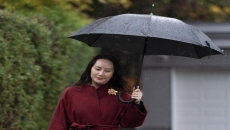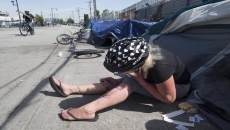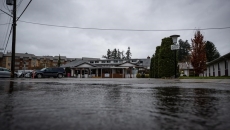An independent report on harassment of women in the RCMP says fundamental change is needed to rid the national police force of a toxic culture that tolerates hateful and homophobic attitudes.
The report released Thursday by former Supreme Court justice Michel Bastarache says it is well past time for the federal government to take meaningful and radical action to address these issues, which have caused incalculable damage.
The report, "Broken Dreams Broken Lives," concludes that change cannot come from within the RCMP, but must be initiated from the outside. It calls for an in-depth, external review of the institution and the future of the force as a federal policing organization.
"One of the key findings of this report is that the culture of the RCMP is toxic and tolerates misogynistic and homophobic attitudes amongst its leaders and members."
Bastarache was the independent assessor who oversaw the provision of millions of dollars in compensation to 2,304 women involved in a class-action settlement.
While acknowledging that his team of assessors met only with those who had experienced serious forms of sexual harassment and discrimination based on their gender or sexual orientation, Bastarache says the accounts were consistent from decade to decade.
"The level of violence and sexual assault that was reported was shocking," he writes in the report.
"Indeed, over 130 claimants disclosed penetrative sexual assaults. Other claimants described a sexualized environment in RCMP workplaces.
"This was characterized by the frequent use of swear words and highly degrading expressions that reference women’s bodies, sexual jokes, innuendoes, discriminatory comments with respect to the abilities of women and unwelcome sexual touching."
Of particular concern in the context of policing was the denial, or the threat of denial, of backup assistance to officers, the report says.
Women who identified as lesbian, bisexual or differently gendered were subjected to ostracization, pejorative comments, sexual assaults and being outed without their consent.
"What the women told the assessors shocked them to their core. This process has forever tarnished the image of the RCMP as a Canadian icon," the report says.
"Bright, well-educated women said that they joined the RCMP seeking to help others, sometimes because they themselves had needed help as a young person. They told the assessors of the brutal treatment they experienced which ground them down, broke their confidence and shattered their trust in their fellow officers."
Many of the hundreds of women interviewed had been diagnosed with serious psychological injuries including major depressive disorder, post-traumatic stress, generalized anxiety, panic attacks and substance dependence.
Claimants also reported a lack of trust in the RCMP, a lack of trust in men, feelings of isolation, withdrawal from social activities, friendships and sexual relations, humiliation, lack of self-esteem and lack of confidence.
"Some reported intentionally injuring themselves repeatedly. Self-blame is common, even after blatant sexual assaults. We heard stories of women who sat with their service revolvers in their mouths and were only stopped from killing themselves when they thought of their children or their pets."
The report makes 52 recommendations on systemic barriers, recruitment, training, human resources and staffing, maternity and parental leave, employment flexibility, grievances and discipline, mental health, promotions, leadership, specialized teams and medical examinations abuse.
.jpg)





